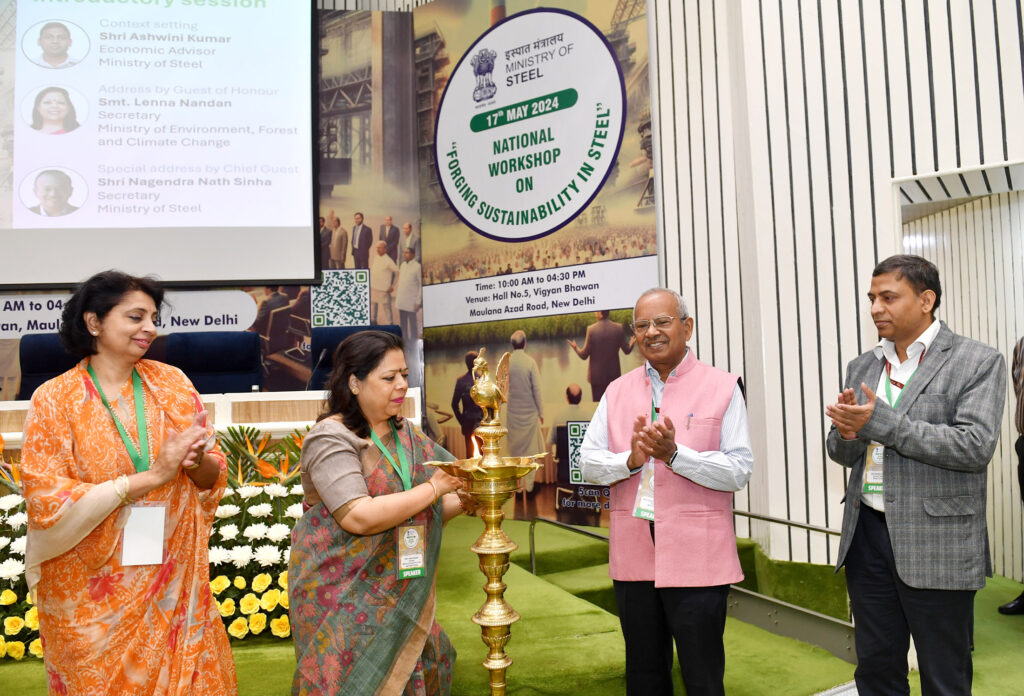New Delhi, 17th of May, 2024 : The Ministry of Steel organized a National Workshop on “Forging Sustainability in the Steel Sector” at Vigyan Bhawan, New Delhi today. The workshop aimed at driving sustainable practices in the steel industry by engaging with stakeholders on the important issues of the steel sector by focusing on the sustainable practices, emerging technologies and tools to mitigate the challenges. The inaugural session was attended by Shri Nagendra Nath Sinha, Secretary Ministry of Steel, Ms. Leena Nandan, Secretary Ministry of Environment, Forest and Climate Change (MoEFCC), officials of Ministry of Steel & PSUs, experts & other stakeholders from Steel sector.

Shri Nagendra Nath Sinha, Secretary Ministry of Steel addressed the inaugural session and said that this workshop is a significant initiative and a continuation of the dialogue the Ministry of Steel is engaging in with other ministries, including the MoEFCC and NITI Aayog, to address the sustainability of the steel sector.
Addressing the challenge of rising carbon emissions amid growing demand, Shri Sinha pointed out that India’s per ton crude steel emission is 25% higher than the global average and is attributed, inter alia, to factors such as lack of natural gas, the quality of available iron ore, which requires beneficiation for use in Direct Reduced Iron (DRI) processes and the limited availability of scrap, with domestic scrap generation standing at only 20-25 million tonnes.
To address these challenges, Shri Sinha mentioned the ongoing efforts of a task force comprising the Ministry of Mines and the Ministry of Environment, Forest and Climate Change which is focused on encouraging the beneficiation of low-grade iron ore to improve its suitability for steelmaking. He also discussed historical factors affecting scrap availability and noted that the policies like Extended Producer Responsibility (EPR) for the auto sector proposed by the Ministry of Environment, Forest and Climate Change, aims at increasing vehicle scrap availability, though the industrial and construction sectors will continue to have higher steel consumption.
Despite these challenges, there is a dire need for undertaking responsible actions to significantly reduce carbon emissions. He pointed out that 90% of emissions in steel making come from Scope 1 (within the factory gates), with the remaining emissions from Scope 2 (electricity generation) and Scope 3 (upstream processes). Therefore, the industry has substantial control over its emissions and must take proactive steps towards sustainability.
“While the Ministry will continue to provide guidance and nudge, it is imperative that the steel industry itself takes up the mantle as trustees of the Earth to work towards reducing emissions and promoting sustainability” Shri Sinha exhorted all the stakeholders concerned.
14 Task Forces of Ministry of Steel
14 task forces have been formed by the Ministry of Steel to tackle various aspects of sustainability in the steel industry such as enhancing energy efficiency through the adoption of the best available technology, utilizing renewable energy sources, and preparing inputs to reduce emissions. The ministry is also exploring the use of green hydrogen and carbon capture, utilization, and storage (CCUS) technologies.
Water consumption in steelmaking
Water consumption in steelmaking was identified as another critical area for improvement. Shri Sinha noted that India’s water consumption levels are higher compared to other countries, with efforts underway to reduce this.
He also lauded the Securities and Exchange Board of India’s (SEBI) introduction of Business Responsibility and Sustainability Reporting Format and urged companies to take it seriously. He emphasized the need for companies to report their current sustainability practices and set medium-term goals, suggesting that regulatory bodies like CPCB and State Pollution Control Boards encourage this practice.
Waste generation and its handling were also discussed, with a focus on the utilization of steel slag in construction aggregates and as a soil modifier in agriculture. Shri Sinha announced that results from ongoing projects in these areas would be released soon.
Marginal Abatement Cost of Carbon
Speaking on one of the tools that was unveiled in the workshop, Marginal Abatement Cost Curve toolkit, he mentioned that it will aid companies in measuring and prioritizing carbon emission reduction technologies. Through this tool, one can prioritize different kind of emission Reducing technologies and processes and choices. He stressed the importance of collecting high-quality emission data specific to individual processes and installations to meet international standards and regulations through this tool.
He urged all stakeholders to collaborate and adopt the best available technologies, highlighting the ministry’s work on green hydrogen-based DRI making. “The Ministry is working with the consortium to handle this issue of green hydrogen based DRI making where the iron will be directly reduced with 100% hydrogen. This technology, although currently expensive, holds promise for a sustainable future if developed and adopted collectively”, he added.
Speaking on the occasion, Ms. Leena Nandan, Secretary Ministry of Environment, Forest and Climate Change stated that “India’s updated Nationally Determined Contributions (NDCs) for 2030 reflect our ambition whereby 50% of our energy will be sourced from non-fossil fuels, and we aim to reduce the emission intensity of our economy by 45%”. She called for transforming ideas into actionable collaborations, stressing that the steel industry’s sustainability efforts must stem from a deep-seated sense of responsibility.
In the spirit of one world, one family and one future, she highlighted key initiatives, such as India-Sweden Industrial Transition Initiative and also emphasized the importance of circular economy practices. She encouraged the use of recycled steel, supported by the Vehicle Scrapping Policy, to enhance resource efficiency. Furthermore, she spotlighted sectors like green hydrogen and carbon capture, where international collaboration is crucial. She underscored the importance of financing and technology to scale up green hydrogen use, aiming to make steel production more sustainable.
In the remaining sessions of the workshop, matters like leveraging the Marginal Abatement Cost Curves (MACC) and disruptive technologies in the steel sector, emphasizing energy efficiency, carbon markets, and AI-based monitoring of emissions, were discussed.










More Stories
India And United States Of America Sign The First Ever ‘Cultural Property Agreement’.
Industrial & Warehousing Demand Remains Healthy With About 13 Mn Sq Ft Of Leasing In H1 2024 – Colliers.
Galgotias University Receives Platinum Rating In Law And Legal Studies From QS I-Gauge.